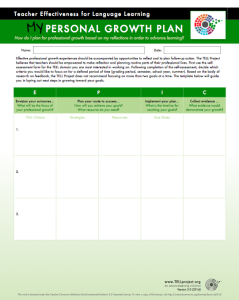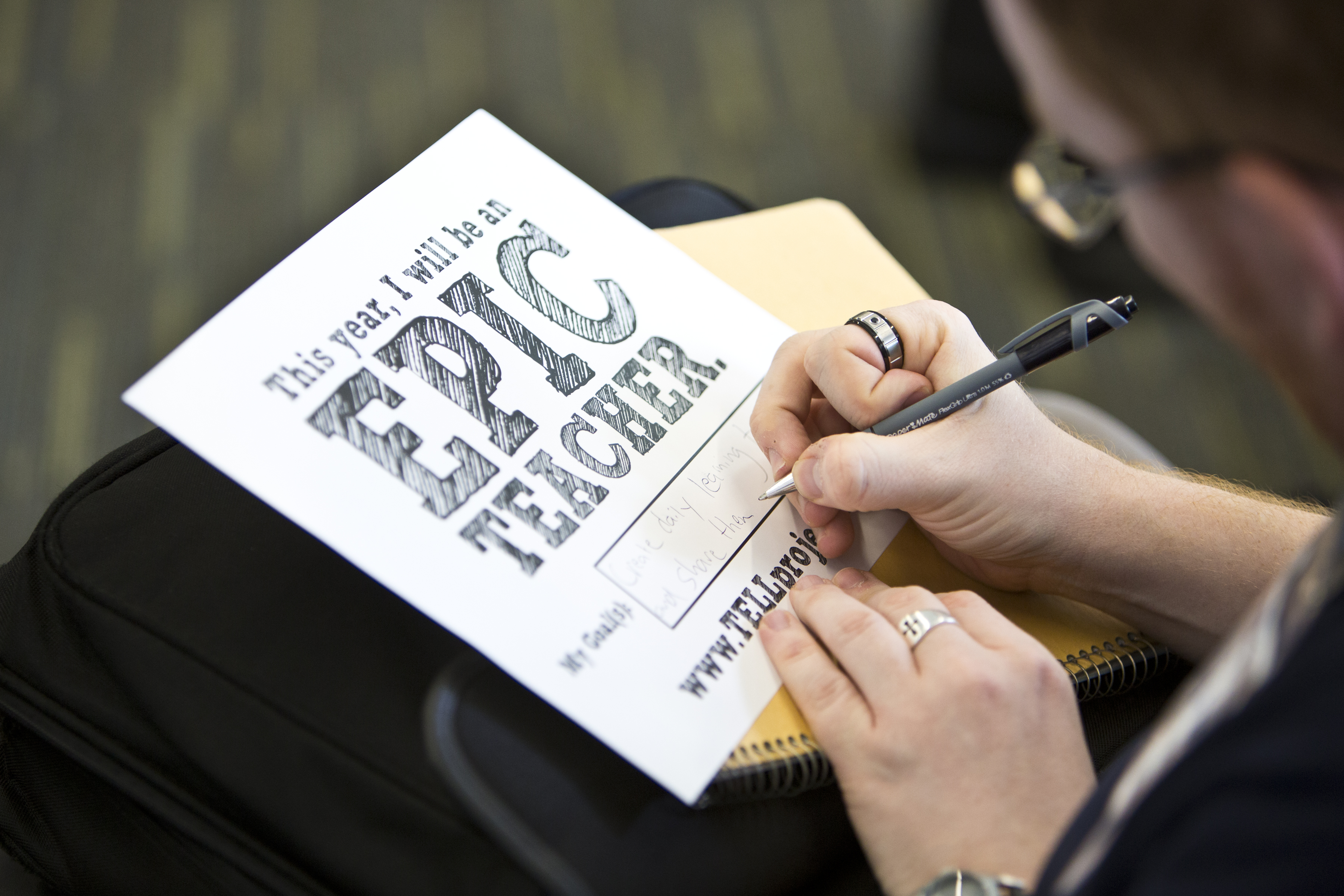It’s that time of year, where news and social media will be flooded with articles both for and against setting goals for the new year. If you are like most people you may have set a couple of resolutions yourself for the new year. What was it? Loosing some weight? Becoming more active? Reading more? Spending more time with family? In a few weeks, we have likely all forgotten what we set out to do and returned to our comfort zone. Teaching is very much the same and each school year we start with the best intentions that this will be the year for proficiency, but then by the end of the September your class roster has changed more times than you can count, there is a new assistant principal, you took on that extra club advisory responsibility, and the resources you ordered at the end of last year never made it in. We get a couple of shots of professionalism in the arm in the fall through professional development, attending a conference (it was great to meet so many teachers at ACTFL this year), or participating in the ever popular #langchat. But making changes on a Tuesday in November is hard. Our classrooms are filled with so many (intentional and unintentional) procedures, then you don’t just walk in one day and announce: “Guess what? Starting today I will speak to you in the language 95% of the time.” And is that really what you should be focusing on right now? Setting goals for yourself has to be based on a realistic assessment of your current abilities, both in your personal life as well as your life as a language teacher. If you can’t jog around a block in your neighborhood, then setting a goal to run a marathon in March doesn’t seem like a realistic goal. Certainly the start of the new year, perhaps the start of a new semester and if you are on block schedule a brand new group of students perhaps, allows us to think about setting some new goals for ourselves and our students.
You are not a bad teacher!
Start by admitting that you are not a bad teacher. All the public focus on teacher effectiveness and teacher evaluation has given teaching a bad name. Add to that so many teachers sharing via blogs, twitter, or other means these days, it’s easy to think you are not good enough. Don’t fall into that trap. Say it with me: I’m a good teacher! I’m a good teacher! I’m a good teacher! Yes, every teacher is on their own journey. You are the teacher today, because your experiences have led you to this place. Your experiences as a language learner in high school or college. Your experiences studying abroad if you had the opportunity. Your experiences in college or as student teacher. Your experiences teaching every single day for the past …. years. All of these experiences have made you a TEACHER! A teacher with strengths and a teacher with room for growth. So don’t compare yourself to other teachers, although other teachers can certainly be an inspiration for your own growth, but compare yourself to YOU. Where are you today and where do you want to be by the end of this school year?
TELL me who I am
Finding out what kind of language teacher you are is easier said than done. You could probably show a group of teachers a video of language classroom and every person in that group would have a different opinion on how effective that teacher was. That’s where the TELL Project can come in really handy, because it’s a framework that provides some common language and definition of what an effective language teacher does. If you take one of the TELL self-assessments, you can figure out who you are as a teacher. There are several options. You could take one of the seven domain self-assessments. Perhaps your school has already identified a specific focus for this year and taking the Performance & Feedback domain self-assessment makes most sense for you. Or if you already have an idea of what you are struggling with and would like to improve upon, you could take one of the more strategy-focused Feedback Tool Self-Assessments. It doesn’t matter which one you complete, just remember, you are not supposed to do all of the things that are on the assessment. That is not the goal. You are a good teacher! Remember? When you go to the doctor’s office for your annual physical and do a blood test, they will likely test it for everything too. That doesn’t mean they are hoping to find everything. While you are taking these self-assessments you have to be honest with yourself.
Setting the Right Goal
Once you have completed your self-assessment(s), it’s time to figure out how to set goals. Wait! Don’t go checking all the things that you are not doing now and turn them into a goal. That’s the teacher trap. So many of us are perfectionists and want to do it all; and do it all the right way, right away. This is where realistic goal setting comes in. Remember that marathon reference from earlier? Go back to your self-assessment and pick out several criteria that you think you might want to work as the new year starts. Pick a couple from the areas that you are doing sometimes or most of the times and then pick a couple from the areas that you don’t do yet at all. Are you seeing any logical connections between a couple of the criteria? Ideally you can pick a TELL statement that you are already doing sometimes or most of the time as a goal (so that you will keep doing it and get even better at it) and combine it with something that you aren’t doing yet. This way, you can use something you already know something about to help you grow and learn even more about. Allow your strengths to help you grow. Perhaps you are already “using a variety of strategies (e.g. visuals, concrete objects, hands-on experiences) to make language comprehensible” (LE4c) most of the time, but you realize that you are not “frequently check for understanding in a variety of ways throughout the lesson” (LE4e). Combine the two to make it a realistic goal for yourself. Try to find one or two of these combination goals and make those your goals for the new year. The point here is to actually grow as teacher and improve our practice, not to check off every single criterion on the self-assessment. If you limit your goals to one or two, you chances of actually meeting them will be much higher.
You can be EPIC in 2016
 Ok, so now you have set a couple of realistic goals for yourself for the rest of the school year! Before you start planning those first lessons for 2016, let’s go back to the dangers of new year’s resolution again for a moment. There is a reason why so many people stop working on them and often forget about their resolution all together come spring time. In order for you to be successful in meeting your goals and make some true changes in your teacher practice, you will want to become an EPIC teacher. EPIC is a growth plan model developed for the TELL Project. You have already completed parts of it by Envisioning your goals and establishing the focus of your professional goals. Now we just have to work on the other three letters. Let’s start with Planning your route to success. How will you achieve your goals and what resources will you need. Start by identifying journal articles, workshops, webinars, conference sessions, YouTube videos that you might want to us on your growth journey this year. While you are identifying those resources, be sure to set a timeline to Implement your plan. Without a deadline, due date, or even just a check-in milestone, none of this is going to happen. Finish your plan by Collecting evidence of your growth. Will you have a colleague come to observe you multiple times and see your growth? Will you take a video of yourself and complete another self-assessment? Will you ask an administrator or professional learning coach to give you feedback? You will want to identify the type of evidence you want to collect that allows you to demonstrate your growth. Just reading an article or participating in a workshop isn’t enough. Classroom evidence is what you are after, because in following this growth plan will allow you to be EPIC in your classroom in 2016!
Ok, so now you have set a couple of realistic goals for yourself for the rest of the school year! Before you start planning those first lessons for 2016, let’s go back to the dangers of new year’s resolution again for a moment. There is a reason why so many people stop working on them and often forget about their resolution all together come spring time. In order for you to be successful in meeting your goals and make some true changes in your teacher practice, you will want to become an EPIC teacher. EPIC is a growth plan model developed for the TELL Project. You have already completed parts of it by Envisioning your goals and establishing the focus of your professional goals. Now we just have to work on the other three letters. Let’s start with Planning your route to success. How will you achieve your goals and what resources will you need. Start by identifying journal articles, workshops, webinars, conference sessions, YouTube videos that you might want to us on your growth journey this year. While you are identifying those resources, be sure to set a timeline to Implement your plan. Without a deadline, due date, or even just a check-in milestone, none of this is going to happen. Finish your plan by Collecting evidence of your growth. Will you have a colleague come to observe you multiple times and see your growth? Will you take a video of yourself and complete another self-assessment? Will you ask an administrator or professional learning coach to give you feedback? You will want to identify the type of evidence you want to collect that allows you to demonstrate your growth. Just reading an article or participating in a workshop isn’t enough. Classroom evidence is what you are after, because in following this growth plan will allow you to be EPIC in your classroom in 2016!
… one more thing. One of the reasons companies and communities are successful in helping people reach their fitness or weight-loss goals, is the public sharing of goals. How about joining hundreds of other language teachers and share your goal for 2016 by posting it at www.EPICteachers.org. Just one more way to help yourself to not just make a resolution but actually meeting your professional goals.
